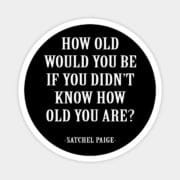A Magnet Challenges My World View
My fridge door is full of magnets with nifty and inspirational sayings.
One of them is from Satchel Paige – “How old would you be if you didn’t know how old you are?” How do I answer that? Do I feel younger than my 50-some years (whatever that means)? Am I trying to tell myself that by feeling “younger”, I can allow myself to feel “good”, “in touch”, “healthy” (and therefore definitely not “old”)!
And what is “young” and “old” anyway? The first means “having lived a short time”, the second “having lived for a long time”. And really isn’t “old” just “not younger”?
But in our society “young/old” also connote being “attractive/ugly”, “trendy/out of touch”, “interesting/dull” or “fun/cranky” – the list goes on. Yet chronological age is an increasingly unreliable benchmark of just about anything about a person. And if our society is so excited about the ability to live longer, why do we stigmatize growing older? Shouldn’t it be a celebration?
 In my search for answers (or at least some interesting questions to ask), I read a book by Ashton Applewhite titled “This Chair Rocks, A Manifesto Against Ageism”. It’s a thought-provoking 278 pages. The author challenges many of the current concepts of aging, and while there is not enough room here to do the book justice about how to fight “ageism” – here are some of my favorites quotes:
In my search for answers (or at least some interesting questions to ask), I read a book by Ashton Applewhite titled “This Chair Rocks, A Manifesto Against Ageism”. It’s a thought-provoking 278 pages. The author challenges many of the current concepts of aging, and while there is not enough room here to do the book justice about how to fight “ageism” – here are some of my favorites quotes:
• All aging is “successful” – not just the sporty version – otherwise, you’re dead.
• Ageism is a prejudice against our own future selves, making us dread our own future.
• Aging is not a disease. Aging is life itself, which is what makes it so damn interesting.
• If you hear “what do you expect at your age?”, find a new doctor.
So back to my magnet – should I remove it from my fridge door? Is the saying ageist? What do you think?
By Lisa Walts, MSW, LICSW – Social Worker at Cadbury Commons






You must be logged in to post a comment.